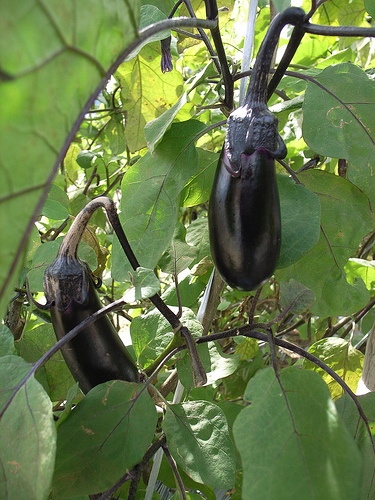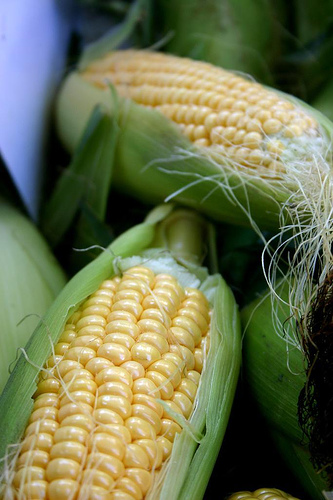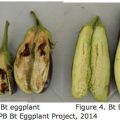An academic think tank backs a stronger policy to authorize planting and release of biotechnology crops like the Bt eggplant and “gene-silenced” non-browning potato which will be Philippines’ key to long term food security amid climate threats and burgeoning population.
The Southeast Asian Regional Center for Graduate Study and Research in Agriculture (SEARCA) said it supports passage of a biotechnology law more forcible than a memorandum circular or administrative order (AO) as long term solutions to hunger will anchor on it.
“SEARCA has BIC (Biotechnology Information Center) which is its one stop shop for biotechnology advocacy. We are in a position to support it (biotechnology law). We will capitalize on SEARCA’s strength in policy research to address the problem,” said SEARCA Director Dr. Gil C. Saguiguit Jr. in a biotechnology forum.
Saguiguit cited SEARCA’s crucial role in policies that affect food production and the environment. Among such support is for a program of Senator Cynthia A. Villar of Senate’s Committee on Agriculture and Food. Villar advocates the Small Farmers Irrigation Act and agriculture insurance program as a strategy to aid farmers against climate change’s adverse effects.
SEARCA, together with the International Service for the Acquisition of Agribiotech Applications (ISAAA), hosts BIC at its headquarters in Los Banos, Laguna.
It supports BIC as part of the SEAMEO’s (South East Asian Ministers of Education Organization) focus to strengthen graduate agriculture education and related agricultural research carried out by academic experts.
Bt eggplant

Bureau of Plant Industry Director Dr. Vivencio R. Mamaril said party list congressmen support filing of a legislation to support biotechnology crop farming.
Among these are the Bt (Bacillus thuringiensis) eggplant, a genetically modified eggplant that resists pest fruit and shoot borer, resulting in higher income for farmers by P50,000 per hectare compared to non-Bt eggplant.
Income increase is due to yield increase by around 50% from disease resistance and from savings from avoidance of pesticide spraying of 60-80 times during an eggplant’s 120-day season. Eggplant yield ranges from 15 to 30 MT per hectare, depending on various factors as variety, location, and disease management.
Mamaril said BPI is just going through evaluation of the results of Bt eggplant’s field trials prior to approval of its commercial propagation and distribution.
‘Gene silencing’ in NBTs
A strong law will be pertinent for Philippines’ long term food security strategy in light of emerging new plant breeding techniques or NBTs that have accelerated breeding of superior food crops some of which are already marketed overseas, Mamaril said.
However, there are concerns on regulations on their safe release to the environment and as food for consumers.
The so-called “genome editing” is involved in these NBTs. It is a type of genetic engineering where the DNA is inserted, deleted or replaced using “engineered nucleases.”
Non-browning potato or non-browning apple is an example with “silenced genes.” The expression of the gene that determines browning of potato or apple is eliminated or reduced.
NBTs are known to give the following advantages according to the NBT Platform:
1. NBTs allow breeding at a more rapid pace compared to conventional breeding, developing resistance to pests, thus cutting pesticide spray needs and reducing adverse environmental impact,
2. NBTs strengthen plants’ resistance to disease and drought, consequently resulting in efficient production, more food, better water use, benefitting consumers, and the environment.
3. NBTs reduce food waste since the non-browning potato, for instance, reduces spoilage of the potato, thus benefitting consumers.
Even before the Philippines starts considering to import or propagate NBTs, government should already come up with a regulation.
Or NBTs will not be allowed to enter into Philippine soil.
“In the absence of regulation, it doesn’t mean it’s not safe. If (Department of Agriculture) Sec. (Emmanuel) Pinol says ‘How are we going to regulate it?’ We will not yet import it. There should always be a policy,” Mamaril said. Policies should be flexible to regulate new plant breeding techniques.”
Bt corn

Biotechnology crops, particularly Bacillus thuringiensis (Bt) corn, have already enormously benefitted Filipino farmers and the Philippine economy. Bt corn area reached 812,000 hectares in 2016. It will eventually make Philippines a corn exporter.
“Congressmen said we should submit the bill. Food safety is what concerns them more. The Philippines now has more than 800,000 hectares of corn planted to herbicide tolerant corn. We started with only 50,000 hectares in 2002. (Apparently) you can’t argue with success,” said Mamaril.
A more permanent legislation should be established to replace the Joint Department Circular (JDC) issued early in the first half of last year by five government agencies as sanction to the research, management, and movement of biotechnology crops.
“Congress is much interested in it. We also want to deal on issues on flexibility because the regulation today may not be able to cover needed regulation in five years,” Mamaril said.
9 billion people to feed
Biotechnology crops are seen to be the more lasting solution to food hunger problems. These are capable of doubling food production amid a projected burgeoning of global population to reach to 9 billion by 2050, according to Dr. Paul S. Teng, ISAAA chairman.
More GM crops are expected to be released to the market soon including the ring spot virus and delayed ripening papaya and the pro-Vitamin A-rich Golden Rice. It will help reduce Vitamin A deficiency cases that cause blindness and susceptibility to infection or diseases.
“In less than two years, maybe that’s the best time that we can expect new biotechnology crops to be released,” Mamaril said.
JDC
Last year, the JDC authorizing biotechnology crops production was issued by the Department of Agriculture (DA0, Department of Environment and Natural Resources, Department of Health, Department of Interior and Local Government, and Department of Science and Technology.
The JDC provides for strict safety regulations on commercialization of biotechnology crops.
Under the JDC, the STRP (Scientific and Technical Review Panel) is formed by the DA and is composed of scientists not employed by DA.
BPI as JDC liaison
The STRP and concerned agencies submit recommendations to the BPI regarding biosafety concerns on biotechnology products.
BPI is mandated to post a summary of the technical reports of the STRP on the websites of National Committee on Biosafety of the Philippines and of BPI as a form of promoting public consultation.
The JDC superseded DA’s Administrative Order No. 8 (AO 8) issued in 2002 as the governing policy on biotechnology crops. AO 8 which was nullified by the Supreme Court in December 2015. The cancellation was on the ground that AO 8 failed to put adequate safety standards set by Executive Order 514 that established the National Biosafety Framework.
Also under the JDC, government agencies are tasked to tap international and local laboratories or institutes to ensure biosafety and carry out risk management in the use of biotechnology crops. Government also arbitrates on tapping National Academy on Science and Technology as final authority in biosafety concerns.
The Biosafety Committees of DA, DENR, DOST, and DOH monitor compliance of operations of biosafety permit holders. End (Growth Publishing for SEARCA).






